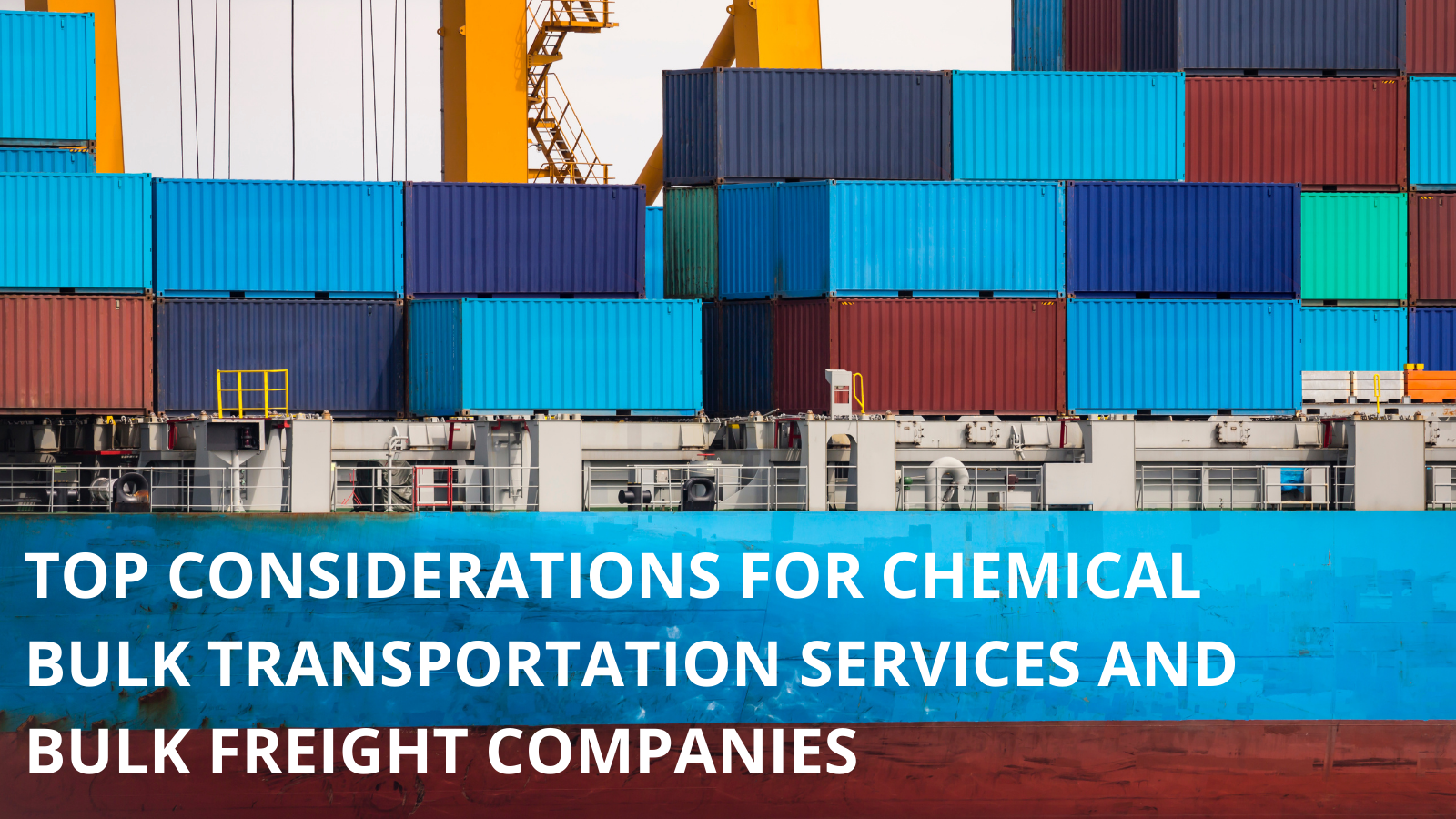Top Considerations for Chemical Bulk Transportation Services and Bulk Freight Companies
.jpg) Pamela Nebiu
October 05, 2021
Pamela Nebiu
October 05, 2021

Few aspects of logistics are as potentially dangerous, costly or important as chemical bulk transportation services. Without the right tools and resources, chemical transportation becomes subject to error and delay, and in some cases, temperature or other factors can put the lives of drivers at stake. However, working with the right freight brokerage companies that know its nuances can help. As noted by Manufacturing.net, “From using the proper tanks during transport, ensuring truck drivers have the necessary training and permits, and having a full knowledge of HAZMAT rules so that chemicals are properly classified as hazardous before transport, the logistics of bulk chemical transportation involves many different aspects.” To avoid ambiguity, this blog will explore the top considerations for chemical bulk transportation services selection and what you need to know before looking for a carrier that can handle such needs.
Part of the challenge with the transporting of bulk chemicals arises from the variability of purchase orders. Unlike palletized freight, shipping for chemical bulk transportation services requires knowing the number of gallons or liters ordered and the unique needs for transit and delivery, such as waiting while the liquid is pumped into a holding tank. Even when pumping the chemicals from a tanker to a holding tank or barrels for warehouse storage, there are other factors to consider, such as viscosity, the pH (acidity) of the material, and density. These factors all contribute to the ease of delivery, the speed of dispensing and the types of tanks that are appropriate for the material. Additionally, tracking the volume dispensed, shipped and waiting to be shipped amounts to managing capacity in greater detail than the typical truckload, so more companies may consider leveraging brokerages that can track and manage liquid transport more easily.
Given that one of the most commonly shipped goods through chemical bulk transport is fuel, it comes as no surprise that delays amount to massive losses in revenue. For example, a delayed tanker moving jet fuel to a major metropolitan airport might not seem vital, but a delay means the planes cannot refuel. A delay could further result in financial compensation to travelers, and there are compounding consequences. Any delay could cost thousands, if not millions, in lost revenue, whether at the airfield or a local gas station.
Another series of challenges arises from the unique pain points of chemical transportation, such as monitoring temperature, considering the need to fit into unusual spaces for dispensing, and maintaining all proper documentation. Without close attention to details of all aspects, it’s easy to make mistakes, resulting in damage, poor quality of product, and added delays. Most of the time, carriers simply fulfill a request for routine shipping. However, when transporting liquids, there may be additional paperwork for regulatory purposes, extra care is needed to ensure the liquids will not interact or leave residue within a tanker, and more. Essentially, the added requirements for transporting liquids means the typical carriers might not have the drivers or expertise needed to manage the journey effectively, putting shippers and their businesses at risk.
All drivers transporting bulk chemicals must have both a CDL and HAZMAT certification. They are further required to inspect all equipment prior to each trip and to make periodic inspections while on the road. This is all in the goal of preventing chemical spills and putting others at risk.
Other considerations in chemical bulk transportation services include knowing the fines and penalties associated with noncompliance. Since the industry is heavily regulated, fines can stack up much faster than many realize. Additionally, many of the penalties levied against violators, including the drivers and shippers, are considered federal crimes, resulting in fines of more than $75,000 and jail time. Clearly, chemical bulk transportation services are not an area of logistics where the lowest-cost option is the best. Instead, it’s finding the right carrier, the right driver, with the right equipment, and connecting the dots to ensure a timely, according-to-regulations delivery.
There is too much at risk to not pay attention when looking for a chemical bulk transportation services provider. A singular mistake could decimate profit margins and literally cause bodily harm and injury to drivers, buyers, and customers. It’s up to each company to know the unique needs and considerations for every chemical or liquid transported and to understand the standard operating procedures for each need. For help in securing transport for your chemical goods, Connect with Edge Logistics today.
About the Author
.jpg)
Pamela Nebiu
Pamela is the Senior Marketing Manager at Edge Logistics. She has a Bachelors of Arts from DePaul University in Public Relations and Advertising with a minor in Photography. Pamela is responsible for overseeing advertising, marketing, press, and social media related to Edge.

